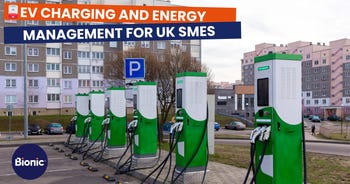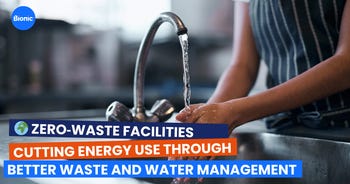The Bionic guide to VAT on business energy
If you run a business, VAT will add an extra 20% to the cost of your energy bills. Not an ideal situation, especially when energy prices are still high.
There are certain circumstances in which your business might be eligible for a reduced rate of 5% VAT. But this discount isn't automatically given, so you'll need to apply to your business energy supplier if you qualify.
Let's take a closer look at VAT on business energy bills, including how to apply for a discounted rate if you're a charity, a nonprofit or if you use a low amount of energy each year.

Five-point summary
- Business energy bills are typically charged a 20% VAT rate, but some businesses (charities, nonprofits, and those with low energy usage) may qualify for a reduced 5% rate. This discount is not applied automatically, so eligible businesses must apply.
- Businesses with a taxable turnover above £90,000 must register for VAT. VAT-registered businesses can claim back VAT on business expenses, including energy costs, but must also charge VAT on their services and file VAT returns quarterly.
- Businesses using less than 3 3kWh of electricity or 145 kWh of gas per day qualify for the 5% VAT rate. Charities can also receive the reduced rate if over 60% of their energy is used for non-business activities or residential purposes.
- Businesses that have overpaid VAT can claim a refund for up to four years by submitting a VAT declaration form to their energy supplier. If a company switches suppliers or has multiple locations, it must file separate claims with each provider.
- Businesses paying 20% VAT are also charged the CCL, a tax designed to encourage energy efficiency. Those eligible for the 5% VAT rate are typically exempt, but companies can also sign a Climate Change Agreement (CCA) to receive a tax discount in exchange for improving energy efficiency.
What is VAT?
VAT is a government tax on services and goods. It is applied to goods bought or sold for consumption or use, including sports, utilities, transport and financial services.
The standard UK VAT rate is currently 20%, but there are other VAT rates which you need to be aware of as a business, including reduced rates charged at 5%.
Should your business be VAT-registered?
If your business’s taxable turnover is more than £90,000 per year, you must, by law, register for VAT. Businesses with an annual turnover of less than this can voluntarily register for VAT.
When you register, HMRC will send you a VAT registration certificate. This confirms:
- Your VAT number
- When to submit your first VAT Return and payment
- Your ‘effective date of registration’ (the date you went over the threshold or the date you asked to register)
If your business isn't legally required to be VAT-registered, it's still worth considering. VAT-registered businesses can add VAT to invoices and claim back the VAT on certain items and services, including business gas and business electricity.
But being VAT-registered isn't without its downsides. If the company you're buying from isn't VAT-registered, you might not be able to claim back VAT on that purchase. And if you generate more VAT than you can reclaim, you could be hit with a hefty VAT bill at year-end.
As with everything in business, it's about weighing up the pros and cons and doing what's best for your business.
What does VAT apply to?
If VAT-registered, you’ll typically include 20% VAT in the price of your goods and services. This VAT needs to be paid to HM Revenue and Customs (HMRC) every three months.
VAT isn’t charged on goods or services that are:
- exempt from VAT
- outside the scope of the UK VAT system
Yes, business gas and electricity are subject to VAT. If your business is VAT registered, then you should be able to recover the VAT as input tax on your business expenses, subject to the normal VAT deduction rules.
It’s important to stay on top of your contract renewals to ensure you’re never paying more than you should. With our Digital Renewals service, we handle all of this for you, for good.
Should you pay VAT on gas and electricity for business?
VAT is payable on all business and domestic energy usage. This means you'll pay VAT on any gas and electricity you use for work purposes. This applies whether at your business premises or working from home. If your business is VAT registered, you should be able to claim back the VAT paid on your utility bills, as you can with other business-to-business transactions.
How much VAT is charged on gas and electricity?
For most businesses, the VAT rate on electricity and gas is 20%, but some are eligible for a discount. Your business energy supplier will automatically add the VAT to your bill, so you need to apply for the discount separately.
All businesses pay VAT on their energy bills, but you can recover some costs by switching utilities. Although you'll still pay the same rate of VAT, if your bills are cheaper, then you'll pay less in tax on them.
VAT on domestic energy is charged at a rate of 5%, which is the rate you'll pay if you work from home. If you work remotely and have low energy usage, you might benefit from the lower rates offered by a business energy tariff, along with the 5% VAT rate.
To switch to a business energy deal when working or running your business from home, you'll need to prove that at least 50% of your household's energy usage is for business purposes.
How much is VAT on a February 2026 business electricity bill?
To give you an idea of how much your business electricity bill should be and how much VAT you can expect to pay, here are the average electricity bills by business size, along with the 5% and 20% VAT rates.
| Business size | Average business electricity bill (per year) | VAT at 5% rate | VAT at 20% rate |
| Microbusiness | £2,791 (based on annual usage of 10,000 kWh) | £140 | £558 |
| Small business | £5,433 (based on annual usage of 20,000 kWh) | £272 | £1,087 |
| Medium business | £10,834 (based on annual usage of 40,000 kWh) | £542 | £2,167 |
| Large business | £14,267 (based on annual usage of 55,000 kWh) | £713 | £2,853 |
Note: Prices are correct as of February 2026. Rates and bill size may vary according to your meter type and business location. The prices you’re quoted may be different from the averages shown. The figures shown are the average unit rates and standing charges quoted by Bionic per business size from February 1 to February 9, 2026.
How much is VAT on a February 2026 business gas bill?
To give you an idea of how much your business gas bill should be and how much VAT you can expect to pay, here are the average gas bills by business size, along with the 5% and 20% VAT rates.
| Business size | Average business gas bill (per year) | VAT at 5% rate | VAT at 20% rate |
| Microbusiness | £869 (based on annual usage of 10,000 kWh) | £43 | £174 |
| Small business | £1,652 (based on annual usage of 22,500 kWh) | £83 | £330 |
| Medium business | £3,318 (based on annual usage of 47,500 kWh) | £166 | £664 |
| Large business | £4,772 (based on annual usage of 65,000 kWh) | £239 | £954 |
Note: Prices are correct as of February 2026. Rates and bill size may vary according to your meter type and business location. The prices you’re quoted may be different from the averages shown. The figures shown are the average unit rates and standing charges quoted by Bionic per business size from February 1 to February 9, 2026.
How to find out your business energy VAT rates
The simplest way to find out how much VAT you're paying is to look at your latest business energy bill. The rate and the amount you've paid that month should be shown with the total amount owed.
What is the business energy VAT threshold?
You should be eligible for a reduced rate of 5% VAT on your gas and electricity bills if your average daily usage is no more than 145 kWh of gas per day (4,397 kWh per month) and 33 kWh (1000 kWh per month) of business electricity.
Do business energy quotes include VAT?
No. When you get a quote for business energy, it won't include VAT. This is because some businesses pay the reduced rate of VAT. If you're concerned about how much VAT will add to the cost of your business energy bills, our tech-enabled experts will be able to work out your rates with these costs added, so let them know when discussing your quotes.
Can your business claim VAT back?
If your business is VAT registered, then you should be able to recover the VAT as input tax on your business expenses, subject to the normal VAT deduction rules. This applies regardless of the VAT rate charged.
To check if and how much input tax your business can claim back, including VAT on energy costs, check the government website for VAT Notice 700, section 10.
Is your business eligible for the reduced rate of 5% VAT on energy?
You may be eligible to pay a reduced 5% rate of VAT on your energy bills if you meet certain requirements:
- At least 60% of your business’s energy is used for dwelling or residential accommodation.
- You are a charitable or non-profit organisation.
You’re regarded as having low energy usage if:
- You use less than 33kWh of electricity per day or 1,000kWh per month.
- You use less than 145kWh of gas per day or 4,397kWh per month. If your usage is low enough, your supplier should automatically apply the VAT discount to your bill – but you’ll have to check with them to make sure.
If your business is eligible for the reduced 5% VAT rate on gas and electricity, your supplier should automatically apply the discount to your bill, so long as you've given them a valid VAT certificate.
If your business has been paying the standard rate of 20% while it's been eligible for the reduced rate, a partial refund can be claimed on any overpayments made during the last four years.
To make a claim, you need to get in touch with your supplier and fill out a declaration form. You will have to contact multiple suppliers and fill in a declaration form from each if any of the following apply to your business:
- You've switched energy suppliers during the last four years or the period you're claiming for
- You have more than one energy supplier (different suppliers for gas and electricity, for instance)
- Your business has multiple sites that are eligible for the discount
You can also get a declaration form from your supplier or from HMRC.
Outside of business energy, you may be able to claim back any VAT paid on goods and services by using your online VAT account.
For a full list of goods and services that VAT applies to, check out VAT rates on different goods and services at GOV.UK
How to apply for lower energy VAT rates
You can register for a lower VAT rate using a VAT Declaration Form – you can get this from your energy supplier. This form can be used to claim a rebate for any overpayments over the past four years, either from your energy supplier or from HMRC.
If your organisation qualifies for a VAT discount, you’ll automatically be exempt from paying certain government levies too.
Do charities pay VAT on energy bills?
If you run a registered charity or non-profit organisation, you should be eligible for the reduced rate of 5% VAT on business gas and electricity. But, as with most tax-related issues, it's not as straightforward as it sounds and the reduction isn't automatically applied.
Your charity will pay 5% VAT on energy if it meets one or more of the following conditions:
- At least 60% of the energy used is for residential accommodation, such as an elderly care home or a children’s home.
- At least 60% of the energy used is for charitable non-business activities, such as free daycare for disabled people.
- Your energy use is classed as 'small-scale'. This low usage is defined as 33kWh of electricity per day (1,000 kWh a month) and 145kWh of gas per day (4,397 kWh a month. It also includes the delivery of 2,300 litres of gas oil a month.
If you use less than 60% of your energy of any of the above, then you'll pay the reduced rate of 5% VAT on the qualifying usage, and the standard 20% rate on the rest.
If, for example, you have a commercial property that is 50% residential home and 50% office space for staff and admin usage, you'll only pay the reduced rate of VAT on the part of the building that's being used as a care home.
How to apply for VAT relief on energy bills
If your business is a registered charity and is eligible for VAT relief or a VAT rebate, you'll need to apply for it by filling in a VAT declaration form, such as this one from Eon.
You'll be able to get a form by getting in touch with your supplier. If you have different suppliers for gas and electricity, you'll need to fill out a form for each.
This discount isn't automatically applied, so your supplier will charge you 20% VAT on energy until you tell them you're eligible for a reduction.
When claiming VAT relief, you'll need to give your supplier evidence that you're a charity. You can do this by using your Charity Commission registration number or a letter of recognition from HM Revenue and Customs (HMRC).
As a registered charity, you'll also be exempt from paying the Climate Change Levy (CCL).
Can you claim backdated VAT overpayments on your energy bills?
You could be owed money if your business has been paying too much VAT on energy. Here’s what to do:
- Check your bills – Gather your energy invoices and look for VAT charges.
- Know your timeframe – You can claim back overpaid VAT for up to four years.
- Get the right form – Contact your energy supplier and ask for a VAT adjustment form.
- Fill it in carefully – Make sure you provide accurate details about the overpaid amounts.
- Send it back – Submit the completed form to your supplier for processing.
You can also backdate any claim for up to four years, meaning you'll get a partial refund on any extra VAT you've paid on your energy bills during that time.
What is the Climate Change Levy?
The Climate Change Levy (CCL) is a tax designed to encourage energy efficiency and reduce gas emissions to make businesses more environmentally responsible. If you qualify for a reduced VAT, you’ll probably qualify for exemption from the main rates of CCL.
The CCL is made up of two rates:
- The main levy rate - If your business pays the standard 20% rate of VAT then it will also be charged the CCL.
- Carbon Price Support rate - This is paid by owners of electricity generating stations and operators of combined heat and power (CHP) stations. If you generate your own energy and make money via the Feed-in Tariff or Smart Export Guarantee, it’s unlikely you’ll pay this as you’ll be classed as a small generator.
What are the current Climate Change Levy rates?
The Climate Change Levy rates are adjusted each financial year. Here are the rates on each fuel type (referred to as a ‘taxable commodity’) for this year and next year.
| Taxable commodity | Rate from April 1, 2022 | Rate from April 1, 2023 | Rate from April 1, 2024 | Rate from April 1, 2025 | Rate from April 1, 2026 |
| Electricity (£ per kilowatt-hour kWh) | 0.00775 | 0.00775 | 0.00775 | 0.00775 | 0.00801 |
| Gas (£ per kWh) | 0.00568 | 0.00672 | 0.00775 | 0.00775 | 0.00801 |
| LPG (£ per kilogram kg) | 0.02175 | 0.02175 | 0.02175 | 0.02175 | 0.02175 |
| Any other taxable commodity (£ per kg) | 0.04449 | 0.05258 | 0.06064 | 0.06064 | 0.06264 |
If you don’t qualify for an exemption from paying these rates, you could sign a Climate Change Agreement (CCA) to get a discount on the tax. In a CCA, you will have to agree to make certain energy efficiency improvements to reduce your business’s consumption and emissions.
What is the percentage discount for holders of a CCA?
| Taxable commodity | Rate from April 1, 2022 | Rate from April 1, 2023 | Rate from April 1, 2024 | Rate from April 1, 2025 | Rate from April 1, 2026 |
| Electricity | 92% | 92% | 92% | 92% | 92% |
| Gas | 86% | 88% | 89% | 89% | 89% |
| LPG | 77% | 77% | 77% | 77% | 77% |
| Any other taxable commodity | 81% | 88% | 89% | 89% | 89% |
What are the current Carbon Price Support rates?
Although it’s unlikely your business will have to pay this portion of the CCL - unless you own an electricity generating station or operate a combined heat and power (CHP) station - here are the current Carbon Price Support rates:
| Carbon Price Support rate commodity | Gas | Petroleum gas or other gaseous hydrocarbon in a liquid state | Coal and other solid fossil fuels |
| Unit | £ per kilowatt hour (kWh) | £ per kilogram (kg) | £ per gigajoule (GJ) on gross calorific value (GCV) |
| April 1, 2016, to March 31, 2027 | 0.00331 | 0.05280 | 1.54790 |
How to cut the cost of your business energy bills
Switching business energy with Bionic is a quick and simple way to cut the cost of your business energy bills. Our tech-enabled experts can compare rates in minutes, and we have access to exclusive deals from some of the UK’s top suppliers.
Running a quick business energy comparison with the help of our tech-enabled experts means your business energy can be sorted in three simple steps:
- Enter your postcode - Give us your business postcode and our tech-enabled energy team will use smart data to get the info we need to run a business energy comparison.
- Get your quotes - Our business energy experts compare business energy suppliers to get your quotes and help you choose the best energy tariff for your business.
- Switch business energy - We contact the suppliers and handle the business energy switch for you. We’ll even take care of renewals to get you the best energy deals every year.
Switching business energy with Bionic could save your business hundreds of pounds each year, but there’s more to it than just saving money - we only work with trusted suppliers who can offer a quality service alongside great rates. For more information on business energy, check out our Bionic guides.
And we can save you even more money by sorting your business insurance, getting you a better deal on business connectivity and finding more competitive rates on a range of business finance options.
To find out more and to see how much you could save on your business essentials, enter your postcode into the box on the right 👉
Frequently asked questions (FAQs) about VAT on business energy
Still not sure about VAT and business energy? Check out the answers to some of the most frequently asked questions below:
What is the VAT rate on business gas and electricity in the UK?
Most UK businesses pay 20% VAT on business gas and electricity, but some qualify for a reduced 5% rate depending on usage and sector.
Which small businesses can get the reduced 5% VAT rate on energy?
You may get 5% VAT if your average usage is below 33 kWh of electricity or 145 kWh of gas per day, or if you meet the UK’s “low usage” rules on monthly kWh.
Do charities and non‑profits pay VAT on business energy bills?
Registered charities and non‑profit organisations can often pay 5% VAT on gas and electricity if at least 60% of their energy is used for residential or charitable non‑business activities.
How can my business check what VAT rate we’re paying on energy?
The VAT rate and amount charged should be clearly shown on your latest business energy bill, alongside unit rates, standing charges and other taxes.
Are business energy quotes in the UK shown with or without VAT?
Business gas and electricity quotes are usually shown excluding VAT, because some organisations qualify for the reduced 5% rate instead of the standard 20%.
Can a VAT‑registered business claim VAT back on energy bills?
If you are VAT registered, you can normally reclaim VAT on eligible business expenses, including gas and electricity, via your VAT return, subject to HMRC’s input tax rules.
How do UK businesses apply for the 5% VAT rate or a VAT refund on energy?
You’ll need to complete a VAT declaration form from your energy supplier to apply the 5% rate and to claim back up to four years of overpaid VAT.
What is the Climate Change Levy, and how does it affect business energy VAT?
Businesses paying 20% VAT are usually charged the Climate Change Levy on top, while those eligible for the 5% VAT rate are often exempt or can reduce the levy via a Climate Change Agreement.








